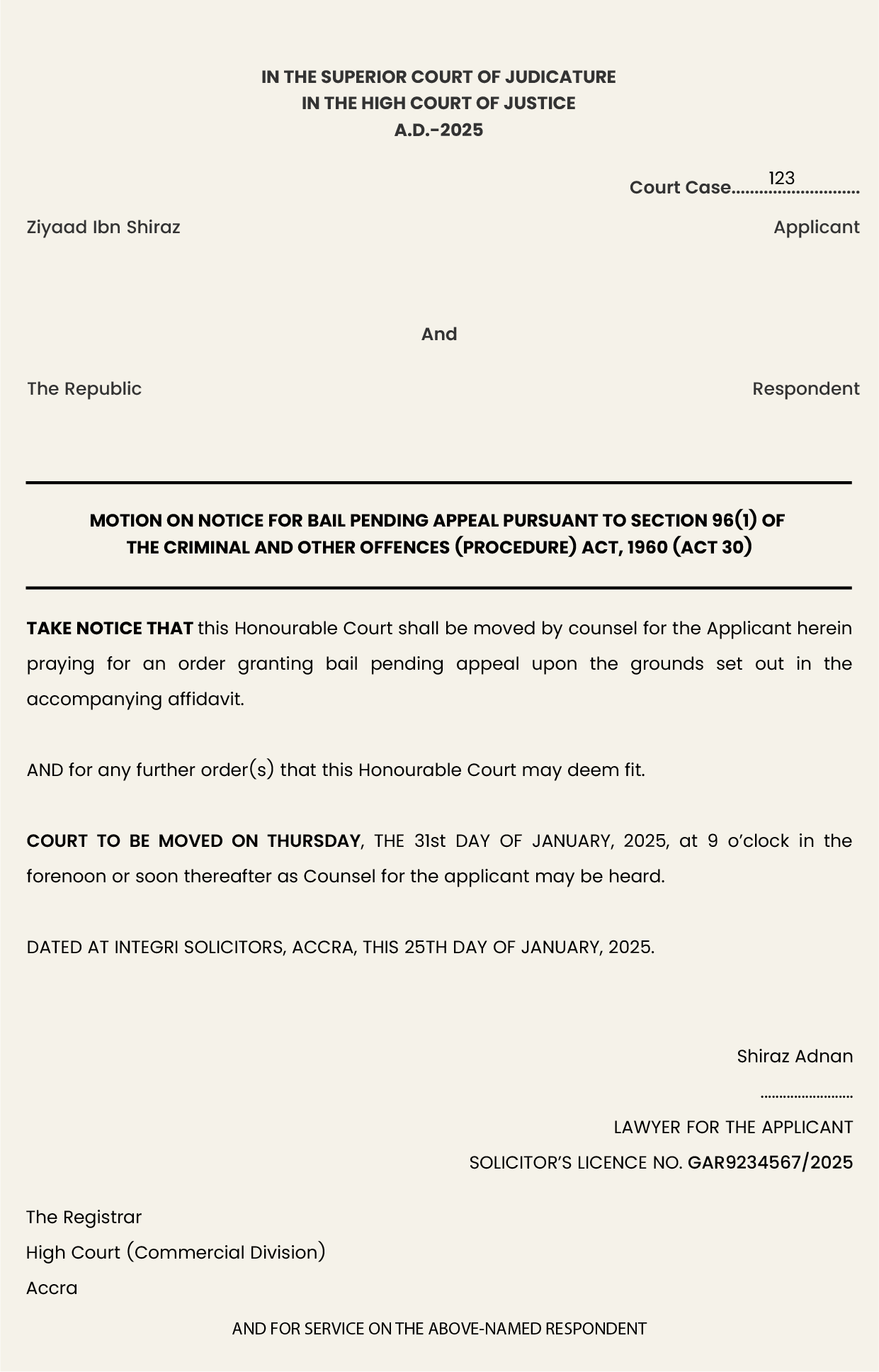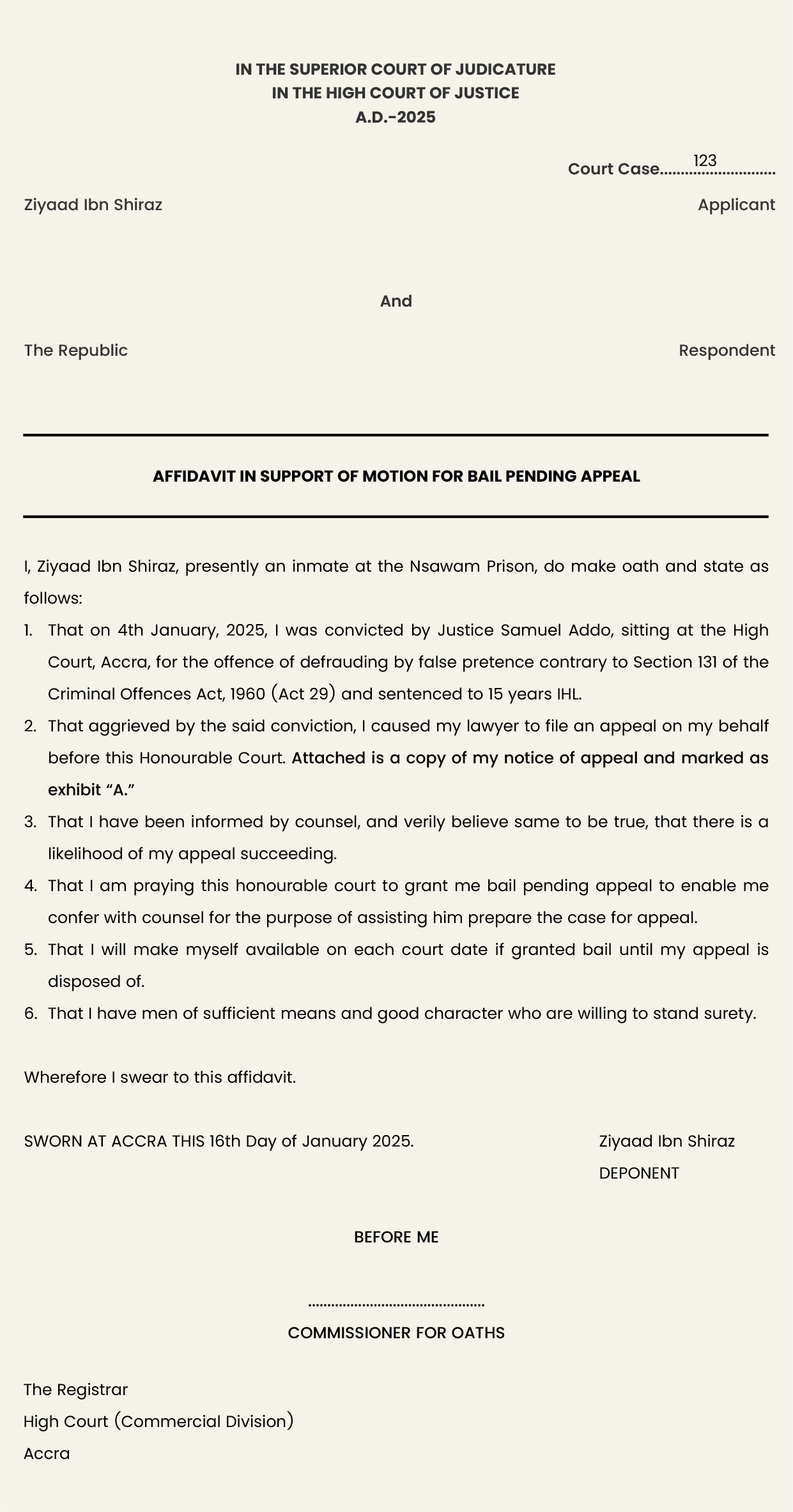Note on Types of Bail: Bail Pending Appeal by Legum
Types of Bail: Bail Pending Appeal
Introduction:
This note will discuss the meaning of bail pending appeal, its unusual nature, the statutory basis for this type of bail, the condition precedent for making an application for bail pending appeal, the grounds upon which the court may grant an application for bail pending appeal, and how to apply for bail pending appeal.
Meaning of Bail Pending Appeal:
This is a type of bail that may be granted to an accused person who has been convicted of an offence but who is appealing his conviction.
Bail Pending Appeal as Unusual:
In the locus classicus case of Fynn and Another v. The Republic [1971] 2 GLR 433-459 , the court explained why bail pending appeal is an unusual application. It advanced that this application:
Involves the proposition that a person who has been found guilty and convicted by a court of competent jurisdiction and whose sentence of imprisonment has not been set aside must nevertheless be let loose on the community instead of his staying in prison to serve a sentence which is prima facie deserved. The matter becomes even more serious where the conviction is not by a grade II district court, manned as such courts are by lay magistrates, but by a judge at the circuit court.
Similarly, in Owusu v. The State [1967] G.L.R. 435, the Court of Appeal observed that:
The principle to be borne in mind is that a conviction is deemed to be right until the contrary is proved. That being the case, grant of bail after conviction is considered an unusual thing hence it is that it will not be granted unless there are exceptional and unusual reasons: R. v. Fitzgerald [(1923) 17 Cr.App.R. 147, C.C.A.]. Thus, in R. v. Gordon [(1912) 7 Cr.App.R. 182, C.C.A.], Darling J., delivering the ruling of the Court of Criminal Appeal said at p. 183, ‘No sufficient reason has been shown to the Court why the unusual course should be taken in granting bail to a convicted prisoner.’ It follows appeal against conviction as was done in State v. Djaba (supra), is inconsistent with the well-known principle of law, and creates a principle based upon no principle.
Statutory Basis for Bail Pending Appeal:
This type of bail is recognised in Section 96(1) of the Criminal and Other Offences (Procedure) Act, 1960 (Act 30), which reads:
(1) Subject to the provisions of this section, a court may grant bail to any person who appears or is brought before it on any process or after being arrested without warrant, and who—
(a) is prepared at any time or at any stage of the proceedings or after conviction pending an appeal to give bail, and..
It is also recognised under Section 33 of the Courts Act 1993 (Act 459) which provides:
(1) The court before which a person is convicted or the court to which an appeal is made may if it thinks fit on the application of an appellant grant the appellant bail pending the determination of his appeal.
(2) Where an appeal has been lodged by a person entitled to appeal, the court to which the appeal is made may, pending the hearing and for reasons to be recorded by it in writing, order that the execution of the sentence or order appealed against be suspended.
(3) The time during which an appellant is released on bail pending the determination of his appeal shall not count as part of any term of imprisonment under his sentence.
(4) Subject to subsection (3) and to any directions which may be given by the court, a sentence of imprisonment shall begin to run as from the day on which the prisoner is received into prison under the sentence.
Condition Precedent for Making an Application for Bail Pending Appeal:
Before an application is made for bail pending appeal, there should be an appeal. If the applicant has not appealed against his conviction, the courts will not grant bail pending appeal.
In the case of Peki and Others v. The Republic [1979] GLR 61-71 , the appellants were convicted of forcible entry by the District Court. They were fined and ordered to enter into a bond of ¢100 each to be of good behaviour for twelve months. In default, they were to go to prison. On the same day, and on an application by counsel for the appellants, they were allowed a respite of the sentence and granted bail. The High Court, in reviewing whether the District Magistrate could grant such bail, stated that the applicable provision was Section 26(5) of the Courts Act, 1971 (Act 372) , which provides that:
"(5) The Court before which a person is convicted or the Court to which an appeal is made may if it thinks fit on the application of an appellant admit the appellant to bail pending the determination of his appeal."
In the opinion of the court, this provision persistently makes mention of “the appellant” and is therefore indicative of the fact that a person must appeal against his conviction in order to bring himself within the designation “appellant.” In light of this, the trial District Court had no authority to grant bail because the appellants had not appealed against their conviction.
Note that Section 26 of Act 372 is now Section 33 of Act 459.
Grounds Upon Which the Court May Grant an Application for Bail Pending Appeal:
In the case of Fynn and Another v. The Republic (supra) , the court advanced the following four grounds upon which this type of bail may be granted:
(1)[Exceptional or Unusual Grounds]If there are exceptional or unusual grounds for the application …
(2)[Likelihood of Appeal Succeeding]If there is a likelihood of the appeal succeeding …
(3)[Conferring with Counsel]If it is a case of such a nature where it would be of assistance for the preparing of a real case for appeal that the appellant should be free to confer with his counsel and prepare his appeal …
(4)[Delays and Serving Jail Term]If having regard to the sentence there is going to be a considerable delay either in preparing the record of appeal or because of the long vacation and in consequence the hearing of the appeal is likely to be unduly delayed resulting in the appellant serving the whole or substantial portion of his sentence…
In the case of Republic v. Registrar of High Court; Ex Parte Attorney-General [1982-83] GLR 407-421 , the Supreme Court cited with approval the decision of R. v. Tunwashe (1935) 2 W.A.C.A. 236 which stated the following two conditions to consider before granting bail pending appeal:
(1) That bail will not be granted pending an appeal save in exceptional circumstances or where the hearing of the appeal is likely to be unduly delayed.
(2) That in dealing with the latter class of case the Courts will have regard not only to the length of time which must elapse before the appeal can be heard but also to the length of the sentence to be appealed from, and further that these two matters will be considered in relation to one another.
How to Apply for Bail Pending Appeal:
The application is done in writing by a motion supported by an affidavit which contains the following:
- One or more of the grounds stated in Fynn and Another v. The Republic and Republic v. Registrar of High Court; Ex Parte Attorney-General (supra).
- The facts of his conviction, such as date, offence, court, punishment.
- A statement that an appeal has been filed and attached as an exhibit.
- A statement that he will avail himself on each court date.
Below is a sample of the motion:

Below is a sample of an affidavit in support of the motion:

Conclusion:
A person who has been convicted can apply for bail pending the determination of his appeal against the conviction. Before making the application, the applicant must have filed an appeal. In determining the application, the court will consider the conditions stated in Fynn and Another v. The Republic and Republic v. Registrar of High Court; Ex Parte Attorney-General (supra) .
Speed
1x